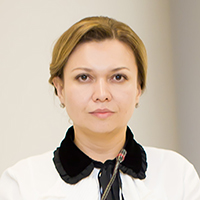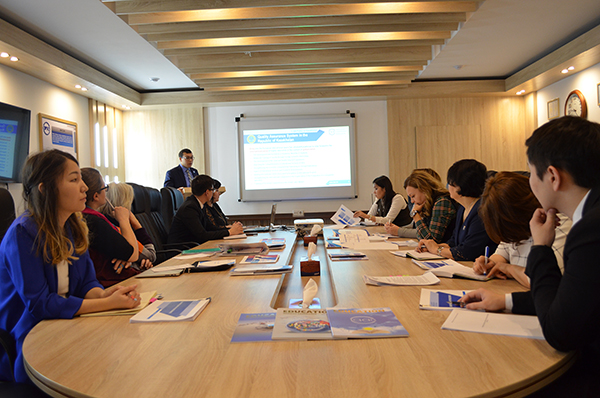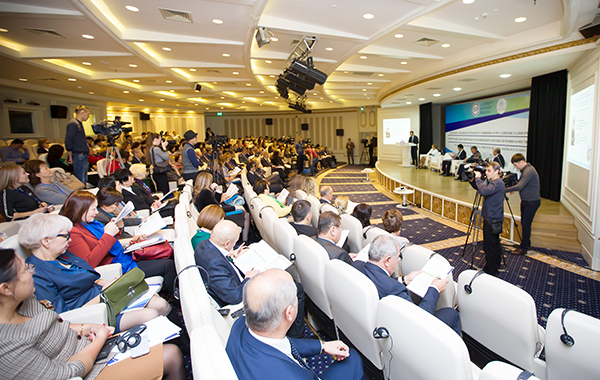Higher Education Trends as a Quality Assurance Factor


Alina Zhumagulova, Director of IAAR, Candidate of Juridical Sciences
Trends in the development of modern society are digitalization and the acceleration of technological changes that lead to the emergence of new fields of activity and new professions. The above trends and changes pose serious challenges for modern higher education. In this context, the development of social integration and the social role of higher education, the development of intercultural understanding and civic participation, the expansion of prospects and opportunities for social mobility and continuous personal and professional growth of young people, their relevance and employment are of particular importance. Lifelong learning and the social dimension of higher education is becoming one of the leading priorities in the development of higher education.
In response to new challenges of the time, higher education institutions in Kazakhstan continue to integrate into the global educational space, develop information technologies and e-education (“smart learning”), attract foreign top managers to implement best practices, and develop partnerships with leading universities in the world. The tasks in the field of higher education, specified in the regulatory legal acts of the Republic of Kazakhstan, the President’s Address to the people of Kazakhstan, N. Nazarbayev’s amendments to the Law of the Republic of Kazakhstan “On Education” in July 2018 direct universities to update educational programs taking into account “future professions, satisfaction of the diverse interests and abilities of students, increasing the competence and motivation of the teaching staff, wide use of international experience, modern educational and digital technologies, increasing responsibility for quality of services [1-3]. New impetus is received by the processes of creating a real competitive environment, expanding the academic and managerial independence of universities, introducing an independent certification system aimed at assessing the competence of graduates, their level of preparedness for working in accordance with the requirements and demands of the labor market.
Non-formal education and recognition of its results acquires a particular importance in Kazakhstan from the point of view of the development of relevant competencies and the ability to work in related industries, as well as of the employment growth, business development and entrepreneurship, the country's economy as a whole. The Law of the Republic of Kazakhstan "On Education" in Art. 37 stipulates that non-formal adult education is carried out by organizations that provide educational services that are provided without taking into account the place, date and form of education, and is accompanied by the issuance of a document confirming the learning outcomes. In October 2018, the following documents were approved: “Rules of recognizing learning outcomes received by adults through non-formal education provided by organizations included in the list of recognized organizations providing non-formal education” [4] and “Rules of recognizing non-formal education organizations and forming a list of recognized organizations providing non-formal education" [5]. These documents regulate the activities of organizations that provide services for non-formal education and the process of recognition of its results. The recognition procedure is carried out by universities, and the task of the state is to determine the list of organizations whose documents on non-formal education can be recognized.
In general, the country's higher education system and accreditation agencies will have to focus in the coming years on the quality of educational services, the internationalization of higher education, the expansion of academic mobility of teachers and students, and the improvement of competitiveness and demand for university graduates.
The leading accreditation agency in Kazakhstan is the Independent Agency for Accreditation and Rating (IAAR). A convincing confirmation of the compliance of external quality assessment procedures with international standards is the high assessment of the activity of the IAAR by an authoritative expert organization - the European Association for Quality Assurance in Higher Education (ENQA).

In 2016, the ENQA Council based on the results of external evaluation established the compliance of the IAAR activities with the Standards and Guidelines for quality assurance in the European Higher Education Area (ESG-2015) [6]. The expert commission positively assessed the quality of the agency’s standards and criteria, developed in accordance with the ESG standards, the involvement of highly qualified experts in the face of international and domestic experts, employers and students, the effectiveness of post-accreditation monitoring procedures, transparency commitment and wide public awareness of their activities.
The ENQA Council, noting the full compliance with the Standards and recommendations on quality assurance in the international space, included the IAAR as a full member in the European Association for Quality Assurance in Higher Education - ENQA. The IAAR was the first accreditation body in Kazakhstan to have the status of a full member of the European Association for Quality Assurance in Higher Education (ENQA) and entered the European Quality Assurance Register for Higher Education (EQAR). This gives the IAAR the right to conduct international accreditation in accordance with international standards.

On November 23, 2018, the ENQA Expert Commission, consisting of Tove Blytt Holmen and Beate Treml, visited the office of the Independent Agency for Accreditation and Rating. The purpose of the visit is to conduct post-monitoring and confirm compliance of the IAAR with the requirements of international standards. During the visit, the members of the Expert Commission met with the leadership and staff, familiarized themselves with the qualitative changes and achievements, key priorities and development prospects of the IAAR. A constructive exchange of views took place on expanding international cooperation in the field of quality assurance of education. At the end of the visit, the ENQA Expert Commission highly appreciated the activity of the IAAR and confirmed its compliance with international standards of quality assurance of education.
With the integration of Kazakhstan into the international educational space, the role of international accreditation as an essential tool of quality assurance of education and the competitiveness of Kazakhstani universities in the national and international educational services market is growing dramatically. Recognition of the IAAR in leading international and European networks to ensure the quality of education opens up broad opportunities for the development of cross-border cooperation in conducting international accreditation of universities and educational programs.
A university that has passed the international accreditation of the IAAR receives a significant competitive advantage in the educational services market. First, it is international recognition, comparability and convertibility of qualifications appropriated by a university, confirmation of the high quality of education and services, and their compliance with international requirements; expanding the potential and possibilities of international cooperation with leading universities of the world. International accreditation for students means expanding areas of academic mobility and training in foreign universities, and most importantly, employment opportunities and improving the competitiveness of graduates in Kazakhstan and the international labor market.
Secondly, it is an increase in the attractiveness of the university and the confidence of the main stakeholders on the effectiveness and efficiency of educational programs implemented. Thirdly, this is the growth of the image of the university and the strengthening of its competitive position in Kazakhstani and international educational services market. Fourth, the university has the opportunity to assess the quality of activities and competing educational programs at a fundamentally new level, to obtain objective information about untapped opportunities, potential and prospects for development, as well as recommendations for the development and implementation of educational innovations.
The IAAR, constantly improving the tools and methodology for international accreditation, seeks to comprehensively promote qualitative institutional changes both in a separate university, and in the entire system of higher education in Kazakhstan, expanding integration into the global educational space and providing access to the external market of international educational services.
REFERENCES:
1. Strategic Development Plan of the Republic of Kazakhstan until 2025 [Electronic resource]: approved by Decree of the President of the Republic of Kazakhstan dated February 15, 2018, No. 636 / Official Website of the President of the Republic of Kazakhstan. - Access mode: http://www.akorda.kz/
2. The Republic of Kazakhstan. Law of the Republic of Kazakhstan. On Education [Electronic resource]: adopted July 27, 2007, № 319-III. / IS Paragraph. - Access mode: http://online.zakon.kz
3. Message of the President of the Republic of Kazakhstan N. Nazarbayev to the people of Kazakhstan "Growing welfare of Kazakh citizens: increase in incomes and quality of life" [Electronic resource]: October 5, 2018 / Official website of the President of the Republic of Kazakhstan. - Access mode: http://www.akorda.kz/
4. Order of the Minister of Education and Science of the Republic of Kazakhstan. On approval of the Rules of recognition of learning outcomes received by adults through non-formal education provided by organizations included in the list of recognized organizations providing non-formal education [Electronic resource]: September 28, 2018 No. 508. Registered with the Ministry of Justice of the Republic of Kazakhstan on October 23, 2018 No. 17588 / Access mode: https://www.zakon.kz/4943666-utverzhdeny-pravila-priznaniya.html
5. Order of the Minister of Education and Science of the Republic of Kazakhstan. On approval of the Rules of recognition of organizations providing non-formal education, and forming a list of recognized organizations providing non-formal education [Electronic resource]: October 4, 2018 No. 537. Registered with the Ministry of Justice of the Republic of Kazakhstan on October 23, 2018 No. 17591 / Access Mode: https://online.zakon.kz/document/?doc_id=33285177
6. Standards and guidelines for quality assurance in higher education in the European Higher Education Area (ESG) [Electronic resource]: approved by the Ministerial Conference in Yerevan, May 2015 / Access Mode: https://enqa.eu/indirme/esg/ESG%20in% 20Russian_by% 20IQAA.pdf